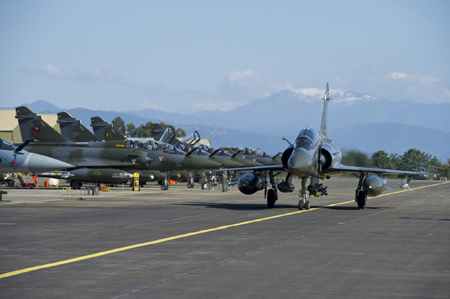Diplomatic and Military Affairs
France eyes fame, gains in Libya
Updated: 2011-03-22 15:17
(Xinhua)
PARIS - Having dispatched its only serving aircraft carrier Charles de Gaulle, France has taken a leading position in the coalition military intervention in Libya after initiating the air strike Saturday.
 |
|
A French Air Force Mirage 2000 fighter jet taxis at the Solenzara military air base before a mission over Libya March 21, 2011.[Photo/Agencies] |
One might expect the United States to have done this, but this time France wants to be in the front rank of the battle against Libyan leader Muammar Gadhafi.
Local media widely interpreted the French government's tough stance toward Libya as a political effort to reclaim France's diplomatic fame that was tarnished in its failure to respond quickly to the unrests in Tunisia and Egypt.
Moreover, France's proposal of strengthening the Union for the Mediterranean (UfM), a multilateral partnership that promotes economic integration and democratic reform across North Africa and the Middle East, was undermined by Gadhafi's refusal to join.
GENERAL APPLAUSE IN FRANCE
|
||||
At the press conference after an emergency summit over Libya in Paris Saturday, French President Nicolas Sarkozy openly accused Gadhafi of defying the international call for a cease-fire, followed by a joint statement the next day warning the Libyan leader of foreign military intervention.
France's prompt reaction, including its push for a UN resolution, won general applause even from opposition parties.
Former French Prime Minister Dominique de Villepin unexpectedly supported his political rival Sarkozy on the issue of Libya. In an interview with local newspaper Le Journal du Dimanche, he welcomed the French initiative led by the president and the foreign minister.
Martine Aubry, head of the biggest opposition party, the Socialist Party, called for an immediate implementation of UN Resolution 1973 that authorized "protection of civilians by all necessary means."
On Saturday the French daily Le Figaro published an article by Jean d'Ormesson, member of the French Academy, with the title "It Should Make Gadhafi Leave." On the newspaper's web, 66 percent of 700,000 French netizens voted for military action against Libya.
REGAIN DIPLOMATIC FAME
France's swift decision and action on Libya sharply contrasted with its recent attitude on Tunisia and Egypt. France was widely criticized for its slow and inappropriate response to Tunisia's political crisis, which directly led to the resignation of France's Foreign Minister Michele Alliot-Marie, predecessor of the incumbent Alain Juppe.
This time, local analysts believe the former colonial power in North Africa intends to use Libya, a heavyweight both in geopolitics and the global energy market, to overhaul its diplomatic image and restore France's strong influence in the region.
"Sarkozy has bet all his hopes on Juppe ... hoping him to recover the fame of France in diplomacy," local newspaper Oushi said in a commentary.
Despite all the criticism against France, Sarkozy's Libya policy proved "France has a strong voice and it can be heard," French writer and historian Max Gallo said.
REBUILD INFLUENCE IN MEDITERRANEAN
Since 2007, the UfM has remained a strategic initiative in Sarkozy's foreign policy, which aims to deepen the cooperation between the European Union and countries along the Mediterranean coast.
However, Libyan leader Gadhafi openly rejected Paris' invitation to attend the UfM's first session in 2008, saying the UfM endangered the unity of the African Union.
Libya's disapproval, as well as the stagnating peace talks between Israel and Palestine, have kept the organization from proceeding, while Sarkozy repeatedly tried to promote the role of the UfM.
Speaking on television on February 27, Sarkozy said the significance of the UfM could be seen clearly when there was political unrest in North Africa.
Upon taking office on March 1, French Foreign Minister Juppe also stressed that strengthening the UfM was on top of France's diplomatic agenda. In that context, the Libyan government's uncooperative gesture constitutes a thorn in the flesh for France.
E-paper

City of Joy
Welcome to the 'world of smiles' where life meanders slowly.
Preview of the coming issue
Debate on nuclear power revived
The future is now
Specials

Beloved polar bear died
Berlin's beloved polar bear Knut, an international star died Saturday.

Panic buying of salt
Worried Chinese shoppers stripped stores of salt on radiation fears.

'Super moon'
The "Super Moon" arrives at its closest point to the Earth in 2011.




